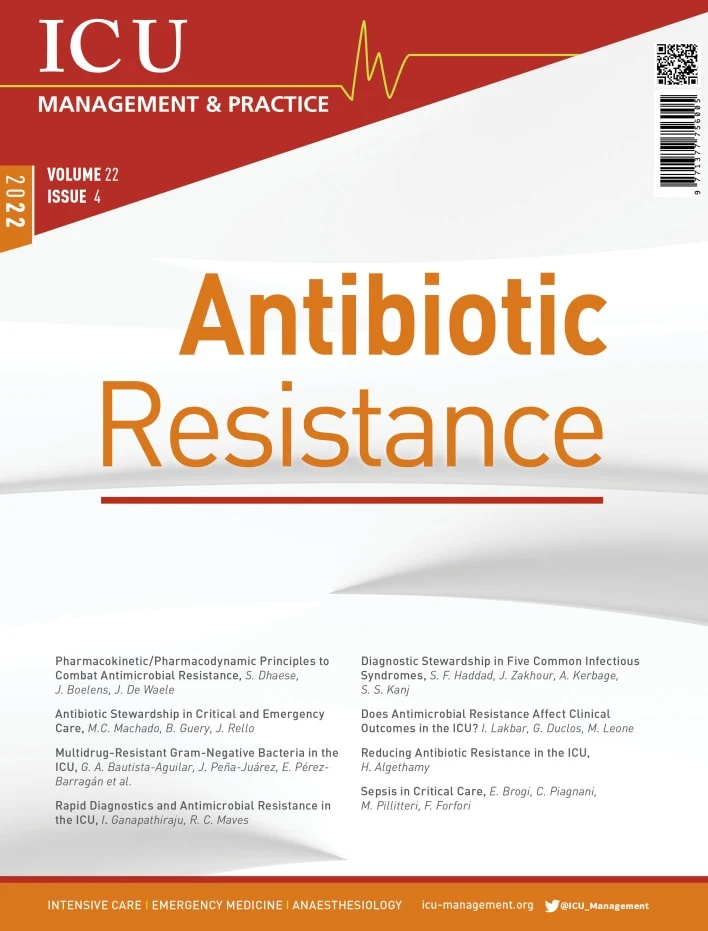
ICU Management & Practice, Volume 22 - Issue 4, 2022
Download PDF |
 |
| SCREEN OPTIMISED |
Download PDF |
 |
| PRINT OPTIMISED |
Editorial
Antibiotic Resistance
Infections occur frequently in critically ill patients in the ICU. They may be the reason for admission and could also be due to immunosuppression associated with critical illness. Antibiotics are essential tools for treating both common and complex infections. It is recommended that antibiotics should be administered as soon as possible once an infection is identified. However, managing these infections c...
Point-of-View
Pancreatic Stone Protein Biomarker for Sepsis, Antimicrobial Resistance and Nosocomial Infections
The problem of antimicrobial resistance and the use of a clinical decision score and point-of-care testing biomarkers, such as CRP and PSP, to help solve this problem. Infectious diseases are a public health issue around the world, with bacterial, viral, parasitic, or fungal-related diseases responsible for 26% of mortality worldwide, and the remaining 74% attributed to non-communicable diseases (cardiova...
Antibiotic Resistance
Pharmacokinetic/Pharmacodynamic Principles to Combat Antimicrobial Resistance
Pharmacodynamic and pharmacokinetic principles play a central role in antimicrobial dose-optimisation to combat antimicrobial resistance. In the future, research focused on the integration of preclinical and clinical data is paramount. The use of antimicrobial drugs in the hospital is very common with approximately 35% of the patients on an adult ward and up to 70% of the patients in the intensive care un...
Antibiotic Stewardship in Critical and Emergency Care
An overview of antimicrobial stewardship in critical care units and emergency departments, highlighting aspects to reduce multidrug resistance focusing on antibiotic optimisation in respiratory infections and sepsis. Infections caused by resistant bacteria are associated with higher treatment costs and increased morbidity and mortality, and bacterial resistance represents a major challenge in global hea...
Multidrug-Resistant Gram-Negative Bacteria in the ICU
Severe infections by antibiotic resistant gram-negative bacteria are frequent in ICU patients. They are associated with high morbidity and mortality. Bacterial infections in patients hospitalised in the Intensive Care Unit (ICU) are frequent, and they elicit an increase in morbidity and mortality. The emerging development of antibiotic resistance in gram-negative bacteria (GNB) is of concern, since they ar...
Rapid Diagnostics and Antimicrobial Resistance in the ICU
The need to address the problem of antimicrobial resistance, the importance of faster diagnosis of bacterial infections and an overview of rapid diagnostic testing. Antimicrobial resistance (AMR) is rapidly increasing on a global scale. The discovery of penicillin revolutionised the field of medicine, providing safe harbour from the most pressing threats of the time—infectious diseases. However, the thr...
Diagnostic Stewardship in Five Common Infectious Syndromes
This article defines diagnostic stewardship and discusses how it can be implemented in intensive care units and how it may improve patient outcomes. Antimicrobial resistance (AMR) is an imminent threat to global health and has been accelerated by the inappropriate use of antimicrobials (Llor and Bjerrum 2014). Antimicrobial stewardship (AMS) is crucial to optimise patient outcomes and minimise drug toxici...
Does Antimicrobial Resistance Affect Clinical Outcomes in the ICU?
An overview of antimicrobial resistance and its impact on clinical outcomes in the ICU. Antimicrobial resistance (AMR) has been defined as a major threat to healthcare and to humanity by the World Health Organization (WHO 2015). The level of evidence for the association between AMR and hospital deaths, hospital length of stay and healthcare-associated costs is growing. Cassini et al. (2019) reported an i...
Reducing Antibiotic Resistance in the ICU
This article reviews practices currently available to reduce the spread of antimicrobial resistance and novel therapies that are presently being developed. Among healthcare providers, and especially among those working with intensive care unit (ICU) patients, one of the greatest concerns that has emerged in recent decades has been a steady escalation in global resistance against antibiotics among certain...
Point-of-View
Short Acting Beta-Blockers in Critically Ill Patients With Heart Failure
An overview of the clinical evidence demonstrating the effectiveness of landiolol for the treatment of atrial fibrillation or atrial flutter with heart failure and effective heart rate control during arrhythmias. Supraventricular arrhythmias (SVTs) are common in post-operative and cardiac ICUs. SVTs increase the risk of death as well as the risk of neurological sequelae. Some common risk factors f...
Improving Clinical Outcomes With Early Enteral Nutrition
An overview of the benefits of early enteral nutrition, clinical evidence and recommendations, reasons for delayed enteral feeding in critically ill patients and optimal solutions. Early enteral nutrition is proven to improve clinical outcomes and reduce acute care costs. Nutrition clinicians support the belief that enteral nutrition is preferable to parenteral nutrition (Seres et al. 2013). The hazards o...
Other Feature Articles
Sepsis in Critical Care
The importance of clearly defining sepsis, improving early recognition strategy, and increasing the understanding of innate and adaptive immune system derangements that facilitate the development of sepsis. The improvement in mortality outcomes of patients with sepsis is attributable to the early recognition of sepsis, better adherence to guidelines, and a prompt organisation's responsiveness. However, se...
DigiConf
Antibiotic Resistance
Antibiotic resistance is one of the most significant public health challenges today. Join our panellists as they discuss the problem of antibiotic resistance, its impact on patient outcomes, the importance of effective antimicrobial stewardship programmes, the role of rapid diagnostic testing, and important strategies to reduce the spread of antimicrobial resistance. Moderator Jean-Louis Vincent (MODERA...
Agenda
Upcoming events/courses/congresses
OCTOBER 13-14 Sepsis 2022 - International Symposium on Infections in the Critically Ill Patient Barcelona, Spain https://iii.hm/1hvz 15-19 EUSEM Congress 2022 Berlin, Germany https://iii.hm/1g2g 17-18 BACCN Conference 2022 Belfast, Northern Ireland https://iii.hm/1hw0 21-25 ANESTHESIOLOGY 2022 New Orleans, USA https://iii.hm/1hvn 22-26 ESICM LIVES 2022 Paris, France https://iii.hm/1g2e 28-29 ESAIC...
















